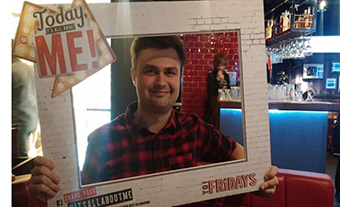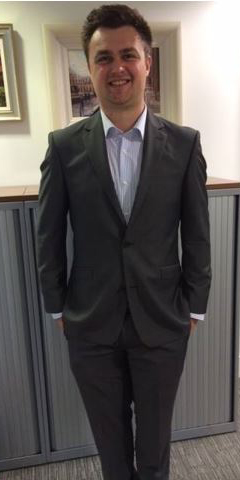February 21, 2017, by Editor
My Pre-reg Adventures: Dawn of the Dread (What to Expect on Exam Day)
This blog has been written by James Smith, one of our MPharm graduates.
For those who have not read my previous pre-reg blogs (which can be found here and here), I recently completed my pharmacy pre-registration training year and have documented my experiences for upcoming aspiring pharmacists soon to go through the same process. For those who do not know, the pre-reg year is effectively a year of on-the-job training that a pharmacy graduate must undertake in order to become a qualified pharmacist. I undertook a split pre-reg year, spending 6 months in hospital and 6 months in industry. Ultimately, pre-regs can work in a community pharmacy, a hospital pharmacy or they can spend 6 months working for a pharma company and 6 months in a hospital.
This blog looks at the day of the exam and what future pre-regs may be able to expect for their exam days. None of the information in the blog is meant to scare anyone – but I hope it will provide a helpful insight so that they can prepare both mentally and logistically.
On the day of the exam, I was starting to feel nervous. I had arrived in Bradford the night before and had spent the evening in my usual pre-exam ritual of half-heartedly reading over my notes whilst watching The Peep Show on Netflix. There is just something about the stress levels of Mark Corrigan that makes me feel like life isn’t so bad. However, the next morning the anxiety had inevitably crept back in and I was fully focused on the long day ahead of me. I ate my pre-brought croissants and fruit salad (purchased from the local supermarket the evening before) before booking a taxi to take my friend and I to the exam centre.
As I arrived at the venue (a solid hour early) I could see some people shaking and crying already. It was evidence that knowledge and exam prep was only half the battle. The other half is all about having a strong mentality. The stress and momentous occasion of the day can (and will) get to people. For many this is the culmination of 5 years of long, hard work. It is challenging to prepare mentally. My coping mechanism was to ensure I had done all I could prior to the exam and frequently reminded myself that I couldn’t have done any more. A relaxing bath (or 3, as I had) the night before and trying to get a good night’s sleep will set you in good stead. Deep breaths and taking a sip of water every now and again on the day also will not hurt. It should help to keep your emotions in check and enable you to focus on the task at hand. Basically, general ‘parent’ advice/nagging applies – apart from when they say ‘you’re a 23 years old pharmacist, you must know that the 3 second rule isn’t a thing’. Sorry but it definitely is.
After signing-in at the desks, I found myself with an hour-long wait. This is the time where people can have a breakdown. You need to know yourself and how you best deal with pre-exam stress. The wait can feel tediously long. You can almost smell the tension and nerves in the air. I took this time to try to relax and gather my composure- remaining quiet with the odd splatter of polite small talk. I could see numerous others following the same strategy, whereas some were frantically reading notes and desperately scrapping for last-minute gems of information that could save them. It is not for me to say one action is better than the other – just do what you feel most comfortable with and what prepares you best. But note: take care not to distract/annoy/scare others. Be considerate!
After the seemingly eternal wait some very formal and mysterious individuals came into the room and called for certain numbers (we were all assigned numbers upon registration, like cattle), and whisked them away to the slaughterhouse/exam hall. Soon my number was called and I made that short walk myself. I entered the large hall with hundreds of desks organised into well-segregated rows and realised that the set up was just like any other exam. I found and sat down at my desk. I organised my pens, pencils and ID out on the desk in a neat OCD fashion, before staring blankly at front stage. The lead invigilator read out the conditions of the exam before we were told we could begin.
This first paper was the calculation paper. I flew through the first few questions and the sound of pages rapidly being turned suggested that others were in the same position. I felt my prep for calculations had been strong since identifying the chink in my armour 2 weeks before. There were only 2 questions where I got muddled up. At these points, I moved on to the next question I could do easily and saved those trickier ones until the end when everything else was answered and I could therefore relax slightly and think more clearly about how to tackle the questions. It was a technique that worked for me, and I ended up working out a method that I felt was suitable. I then had time to fly through the paper to double check those slightly tougher questions and to double check significant figures/units of answers were correct before time was up. Overall, the first paper was not as bad as feared.
As I left the hall, the chatter grew in volume with predominant topics of conversation focused on specific questions from the paper. I have always hated discussing a paper immediately after sitting it. I especially hate it when I have another paper to sit in the afternoon. I therefore tried to avoid the chatter, palming off specific questions about what I had got for question X with responses like: ‘Ah yeah, I think it went well…’. Myself and a couple of others agreed no more discussion of specific questions, before sitting down to a quiet lunch and drink over 2 hours- a chance to recoup and refocus on the second exam.
I highly recommend taking your own packed lunch with you on the day. It is a long day and some of the exam centres (Bradford being a prime example) were miles away from any source of food. There was a pitiful looking table with some sandwiches and unripe fruit available to buy (with no card machine) in the waiting hall, but to survive the day you need to make sure your body is fully fuelled in the correct way. The last thing you want is to be stranded with no food after 2 hours of pure concentration, followed by a 2 hour stressful wait for another 2 hours of pure brain exercise.
Unlike the waiting period at the start of the day, lunch flew by and in no time at all, the FBI-comparable personnel were back in the room, calling out number ranges and asking people to move on. I sat down at the same desk as before and organised myself again. The second paper began. Unlike the calculations paper, I took a slow and steady approach. I read the question carefully before reading the answer options. Naturally, if the answer leapt out at me I wasted no time in circling the option I deemed to be correct. For those that were less certain but I still had a clue, I tried to remain calm and applied a series of logic as to why each answer may be correct or incorrect. There were a tiny number of questions where I had literally no clue – I saved these for the end before attempting to eliminate as many options as possible, before applying the well-tested and valid method of eeny-meeny-miny-mo between the surviving candidates.
In short, remaining calm and using knowledge of the pharmacology of a drug or the legislation around specific drugs/services to eliminate nonsensical answers and make an educated guess was a valid technique. But imagining that you were in the situation described in the question and thinking ‘what could/should/would I do?’ is probably the best way to go in my humble opinion. The exam is designed to test how you remain calm and apply knowledge and logic to work through all the possible options in a very real pharmacy situation and then make a sensible decision – it is not just about the knowledge of everything under the sun and reeling facts off at alarming speeds.
The exam flew by. Time was called and a mixture of emotions overtook me. I was ecstatic that it was over and I had felt it went OK. I was relieved. But more than anything else, I was exhausted. A near 2-hour train journey from Bradford to Liverpool (and my super comfy bed) was the last thing I wanted. That lead to a slight anger, disappointment, despair and hunger (especially for some comforting saturated fats).
On the way home, there was talk about heading out into Liverpool for some drinks. Sadly, this was the day I realised that I was no longer an undergraduate. I rejected the opportunity (as did most others) in favour of a quiet takeaway, film and early night. Pre-reg exam-induced exhaustion had won this night- I saved my celebrations for the following evening.
I spent the next month continuing working at BMS. On the last day of my placement, the results were released. I scoured the long, long list of those who had successfully navigated the choppy seas of pre-reg and reached the ‘calm’ lakes of qualification. There was my name. JAMES SMITH. Of course, having a name like mine means you must be very certain that it actually refers to you. Back in year 9, I received the report of another James Smith in my year group. I got grounded for a month before realising they had given me the wrong envelope. On the plus side, that period of ‘martyrdom’ was hugely useful in guilt tripping my parents into extra funding as a poor undergraduate…(just kidding Mum and Dad)!
Thankfully, on the list of pre-reg names was my glorious middle name (which shall remain a mystery to you all), along with my pre-reg number. I had passed! Once my documentation was sent off, I would be a pharmacist. It was the ultimate happy ending to the pre-reg year that most pre-regs experience. 5 years of hard work finished. It meant I could go into my PhD being able to support my stipend with a nice supplementary pay package, making life more comfortable. Passing the exam for others meant that they got their dream jobs in hospital and community sectors alike. It was a great feeling and was celebrated in the style it deserved.
For me, next up was a return to work for the British National Formulary (BNF) for a couple of months, before heading up to Durham University to begin the next chapter of my career – a PhD in Chemistry. I now locum the odd shift in community pharmacies in the chilly northeast of England, whilst continuing my work for the BNF from the warmth of my bedroom and making scary, supramolecular jelly things in which to grow/crystallize drugs (in a very non-breaking bad kind of way).
Thank you for taking the time to read my latest blog instalment. For any questions regarding any of my pre-reg or other experiences, please email james.philip.smith@hotmail.co.uk or message via Linkedin or twitter
-comments below may not reach me personally.
No comments yet, fill out a comment to be the first




Leave a Reply